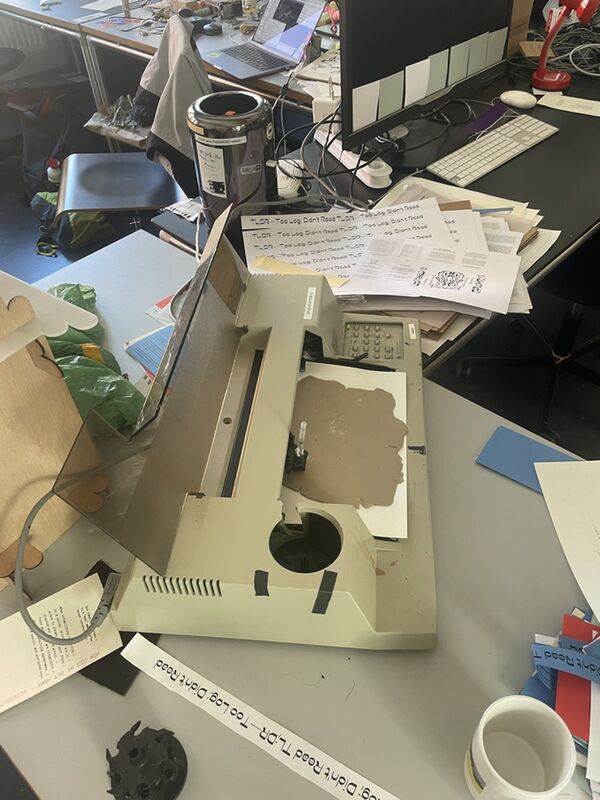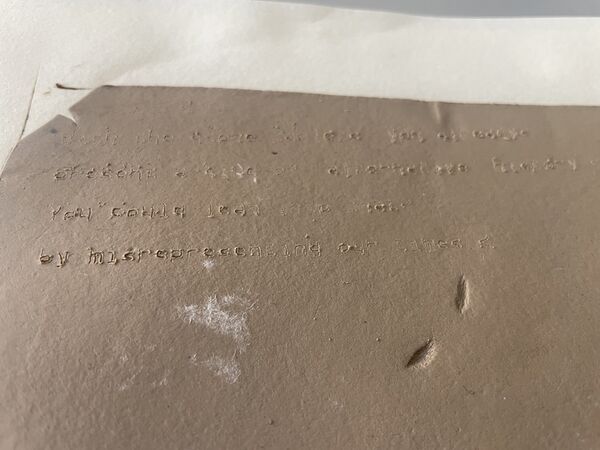User:ØverLørd/PMOMNBM
Or: Projects that May Or May Not Be Made
Clay Tabloids
What is it?
A publishing practice that publishes a clay tablet "newspaper". The distribution of said paper should be performed in a ritualistic manner promoting a speculative, archeological and fringe-scientific narrative.
Why make it?
To invite to reflection around media's permanence and media-consumption(social and political mainly(maybe?)), make people responsible for objects that will ideally remain for millennia, as well as inviting to reimagine or speculate around early recorded history.
Workflow
Somehow source material for the paper, probably by asking people about what they would like to share with a public 4000 years in the future. Pen plotting (or some other "efficient means" of "mass"-producing such newspaper).
Rapid prototypes
Asking Thijs: With the stone tablets, you already present a kind of 'alternative' history. You could lean into that by misrepresenting our times.

By making a very thin sheet of clay and sticking it to a piece of paper
the HP7475A was able to plot using a needle attachet to an old pen-plotter-pen

Worlds first ever pen plotted clay tablet
Previous practice
Publishing practices is already something Im exploring…
Relation to a wider context
An opposition to the extremely fast pace consumeristic approach to ICT's in the current big media-landscape.
Choices made
Using clay as an OG storage-midia
Using pen plotter as an obsolete media
Time is very much present in both of these
A public 4000 years in the future makes room for a lot of speculation
ROTTERDAM UNIVERSITY OF APPLIED FRINGE SCIENCES
The connotation of "fringe science" is that the enterprise is rational but is unlikely to produce good results for a variety of reasons, including incomplete or contradictory evidence.
what it is:
The university of applied fringe science is a space that utilizes fringe scientific methods to conduct research.
why it is:
an attempt to interrogate and reimagine educational institutions, and explore questions such as: what can be considered research, Why research, methods for researching…
Workflow:
get aquanted with beareucratic procedures and structures that make up a educational institution. Reach out to other scientific communitites to get insight into what makes science. Apply the fringe scientifc research and publish the findings in some way or another, in line with the fringe scientific tradition this shoouldn ot be done in a conventional manner.
The university probably needs some staff and some students, so maybe ther would be an application process.
Timetable
A table located at the RUAFS with a couple of watches and other time-telling devices.
Rapid prototype:
https://hub.xpub.nl/chopchop/~v/RUAFS/rapid.html
Previous practice:
All my life I though I'd be a scientist, I guess I am in a way. thats why this is a good idea. Also Im interested in speculative design, as a method of exploration of designs role in society.
Relation to a wider context:
I think this rleates to the post-truth media-paradigm, and can also provide forms of instituional critique and question the power of defining knowledge.
Choices made:
At some point I stumbled upon the wikipedia article for "frinege science" which to me sounds like a disciplin within science, and thus should be explored in a scientifc instituion as the RUAS. I think there are some itnersting nuances presented in this article regarding the difference between pseudo and fringe science…
